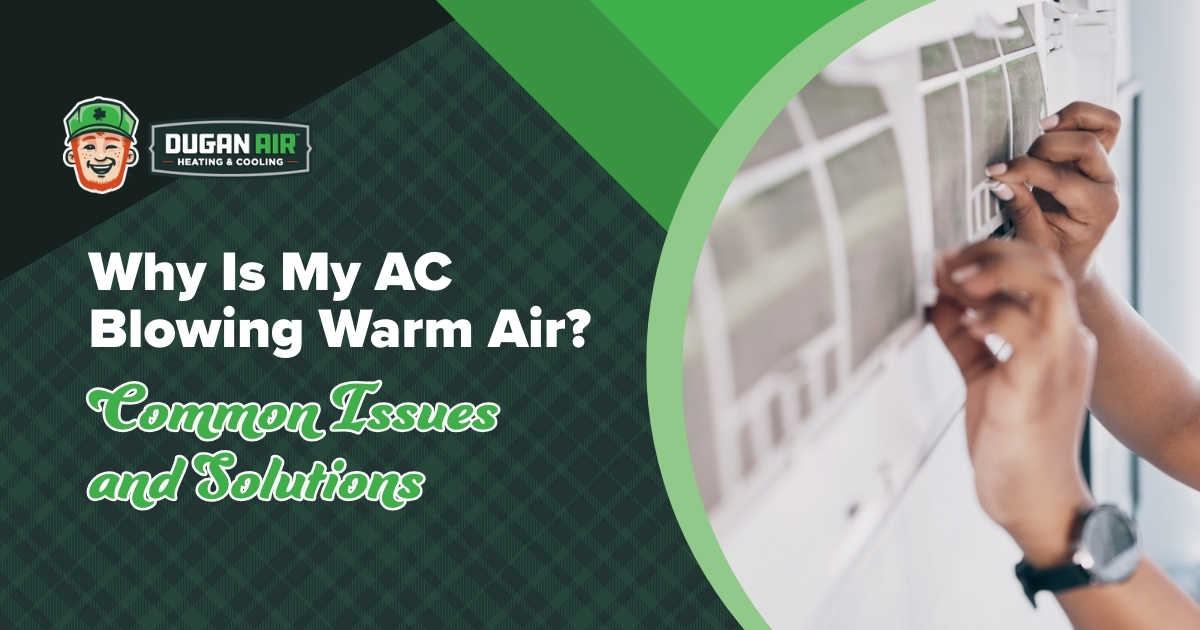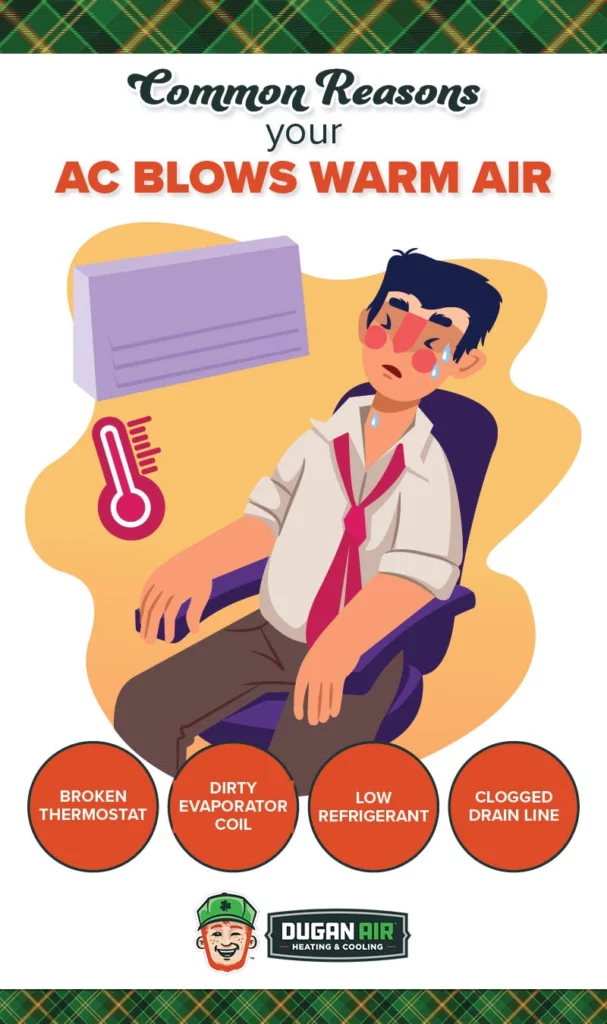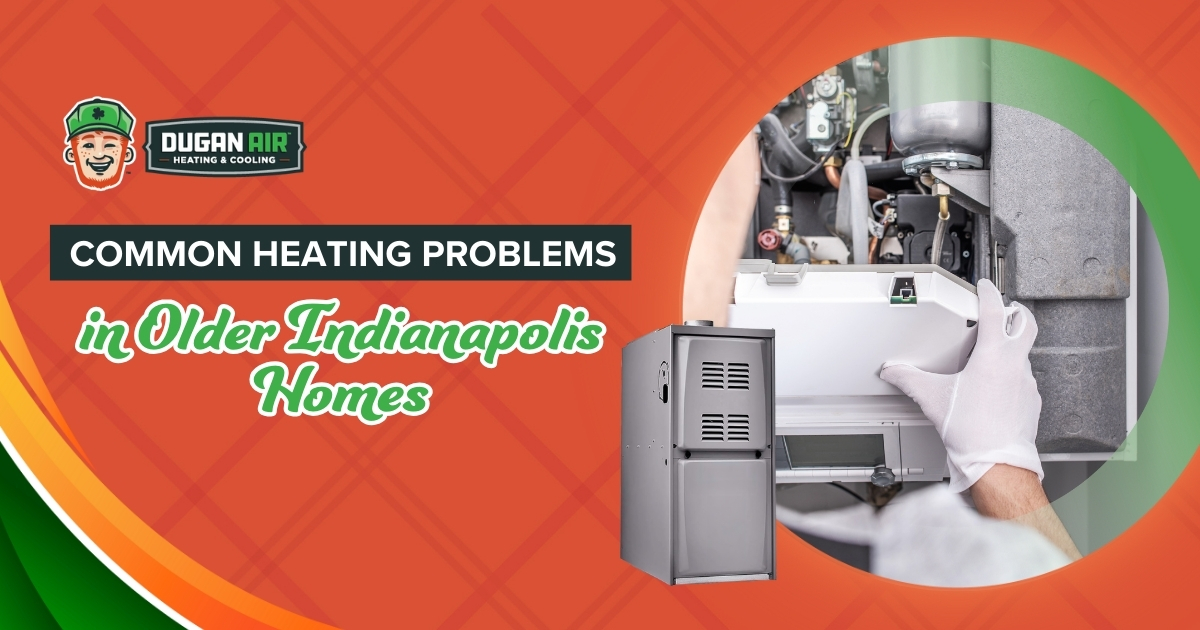Why Is My AC Blowing Warm Air? Common Issues and Solutions

With Indiana summer temperatures regularly reaching 83°F, a reliable air conditioner is a must-have for your home. However, problems like low refrigerant levels can sometimes cause your AC to blow warm air, making your home feel even hotter.
Explore some common causes of an AC blowing warm air, DIY troubleshooting tips, and when to call the team at Dugan Air Heating & Cooling for professional AC repair services.
Common Reasons Your AC Blows Warm Air

The following air conditioner problems are among the most common causes of an AC blowing warm air.
Broken thermostat
Thermostat failure is a common cause of HVAC systems blowing the wrong temperature. Make sure your thermostat is set to the correct temperature and has fresh batteries (if it’s battery-operated). Also, check thermostat placement — a sensor directly in front of a fan or vent can cause a temperature misreading, which may trigger your AC to blow warm air.
Dirty evaporator coil
When your evaporator coil gets dirty, it’s difficult for your AC to work properly. The most common cause of a dirty evaporator coil is dirty air filters. Change your AC filters at least every three months, or as directed by the manufacturer. Regularly cleaning and changing the AC filters helps prevent the buildup of dirt on evaporator coils.
Low refrigerant
Refrigerants allow your air conditioner to cool your home. Refrigerant levels should remain consistent in your AC, but they can drop if there’s a leak somewhere in the system. If the leak is small and gradual, you may not notice until your energy bills start to rise and your AC begins blowing cold air.
AC refrigerant can be hazardous to your health, so call a pro if you suspect a leak.
Clogged drainage line
The drainage line allows condensation to flow out from your AC so it can continue cooling your home. If the line becomes blocked with dirt or debris, ice can accumulate inside the unit, preventing air from flowing smoothly and causing your AC to blow hot air.
If you’re comfortable with DIY, you can try flushing the drain line yourself with hot water or distilled white vinegar. However, contact a pro if you’re not comfortable with DIY or you’re concerned about damaging the system.
Role of Refrigerant Levels in AC Operation
Refrigerant enables your air conditioner to function as a cooling system. As warm air flows through your AC, the refrigerant absorbs heat from the air. The refrigerant then cycles to the outdoor part of the unit, where it releases the heat it absorbed.
When your AC is working properly, the amount of refrigerant remains the same as it moves through the system, allowing your air conditioner to deliver consistent cooling power. However, if refrigerant is lost through a leak, it can no longer absorb the same volume of heat from your indoor air.
Refrigerant quality has evolved significantly over the years, with the introduction of safer and more environmentally friendly refrigerants. Learn more about refrigerant changes in 2025 and the tax credits and rebates available for upgrading your air conditioning system.
Importance of Regular AC Maintenance
Practicing regular AC maintenance keeps your air conditioner in good working condition. Routine checkups help to prolong service life, keep your home cool, and catch issues before they become a safety risk.
Prolongs system life
Most modern AC systems last between 15 to 20 years with proper care. However, without regular maintenance, small breakages can damage other parts of the system, reducing AC lifespan or leading to costly repairs. Routine AC maintenance helps catch wear and tear before it becomes an issue.
Maintains cooling power
Problems like refrigerant leaks impact your system’s ability to cool your home. AC maintenance practices catch small leaks so you can get them fixed promptly and keep your home cool.
Keeps your home safe
Some AC breakdowns pose a risk to your family’s health and safety. Regular AC maintenance helps detect potential refrigerant leaks so they can be fixed before they become an issue.
Schedule routine AC maintenance and furnace tune-ups at least once a year to keep your system running smoothly. Your pro will clean your AC system, look for potential issues, and advise you on HVAC maintenance tips for preventing AC damage.
DIY Troubleshooting for AC Blowing Warm Air
If your AC is running but not cooling your home, try these tips for troubleshooting AC issues.
Check the thermostat
Make sure the thermostat’s power is on, it’s not in the path of any vents, and is set to the correct temperature. You can also try resetting the thermostat if you suspect it’s malfunctioning.
Check the breaker
In most cases, a tripped breaker will shut off your entire air conditioning unit, but sometimes the indoor and outdoor components have different systems. Ensure the power is on to all components, and check both units for power if you’ve recently experienced a power surge or outage.
Clear the vents
Check that any intake and outtake vents are clear and unobstructed. When inspecting the outdoor unit, look for debris that may have blown into the system and blocked airflow.
Change the filters
Check your AC filters to make sure they’re clean. If it’s been more than three months since you’ve changed the filters, consider changing them now. Clean air filters help your air conditioner run efficiently.
When To Call a Professional HVAC Technician
If you’re dealing with any of the following situations, it may be time to call for professional AC repair:
You suspect a refrigerant leak
If you think your AC may be leaking refrigerant, it’s best to call a professional as soon as possible. In addition to blowing warm air, a leaking AC may make a hissing noise, develop ice buildup around the evaporator coils, emit a sweet or chemical smell, or increase your electricity bill. Refrigerant leaks are a health hazard, so consult a professional technician if you notice any of these signs.
Your AC needs internal cleaning
While some drain line and outdoor cleaning can be managed with some DIY experience, it’s best to avoid cleaning internal components yourself. Generally, if you need to unscrew something to access a part, wait and call a pro. This helps avoid damage to your system, voiding your warranty, and safety risks associated with AC repair.
You can’t identify the issue
An AC blowing warm air can be caused by a variety of issues, many of which aren’t immediately obvious. If you’ve tried basic troubleshooting steps, such as checking the thermostat and changing the filters, contact a professional to diagnose and fix the issue.
Stay Cool With Dugan Air’s AC Services
If your AC is blowing warm air, you don’t need to sweat it out — choose Dugan Air for top-notch HVAC services with a no-shenanigans approach and a touch of Irish charm. From refrigerant leaks to dirty condenser coils, our technicians are prepared with the expert tools and knowledge to solve the problem. Contact us today for reliable, expert solutions to your AC issues and get your home back to feeling cool again.

HOW CAN WE HELP?
Request Service Mobile


Join Our Premium Clover Club
Take Advantage of Our HVAC Maintenance Plan
Have you ever wondered if a service plan is really the pot of gold it’s rumored to be? Trust us — ours is! Signing up for a Premium Clover Club membership includes the following perks:
- Annual heating and cooling checks
- Discounts on repairs and parts
- Waived service call and overtime fees
- Priority scheduling
- Peace of mind
 Upgrade Today: $2,009 Buy-Back Credit for Your Old AC & Furnace! Financing Available!
Upgrade Today: $2,009 Buy-Back Credit for Your Old AC & Furnace! Financing Available!








